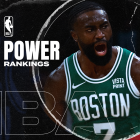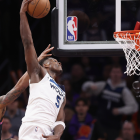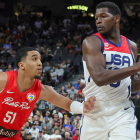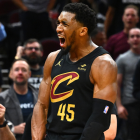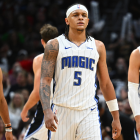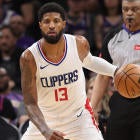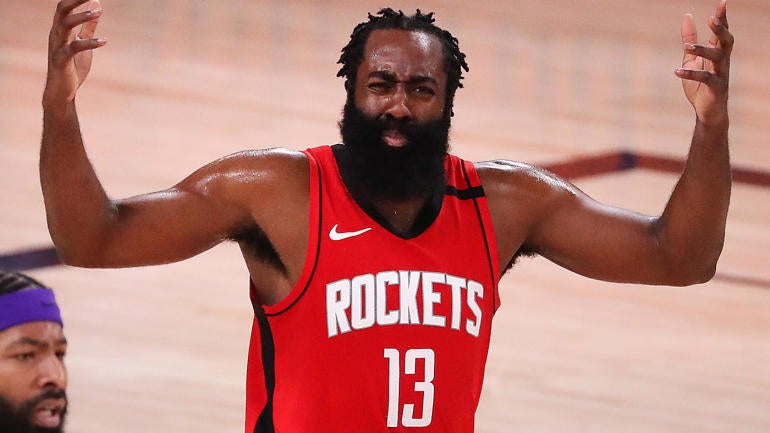
It's hard not to love Houston Astros manager Dusty Baker. Down 3-0 in the ALCS to the Tampa Bay Rays, Astros starter Zach Greinke allowed two baserunners with one out in the sixth inning. Greinke had pitched brilliantly as Houston built a 4-2 lead, but his pitch count was racking up and he hadn't completed six innings in over a month. At a point in baseball when relief pitchers are entering games earlier and earlier, the math -- and common sense -- said to take Greinke out.
But Baker, the oldest manager in the MLB at 71, went with one of those old-school gut feelings that have received so much derision in recent years and left the veteran righty in. Greinke struck out two Rays, including the hottest hitter in the playoffs, to finish the inning without allowing a run, and the Astros went on to stave off elimination with a 4-3 win.
The lesson applies across sports, and really across all professions. Analytics are important and can be incredibly instructive, but sometimes, especially in the postseason, you have to go against tradition to win games.
Which brings us to another one of Houston's major sports teams, the Rockets, who have a new general manager in Rafael Stone and will soon have a new head coach after Mike D'Antoni announced he wouldn't return and longtime GM Daryl Morey resigned. There's no time like the present to address their style of play and the reasons why they haven't been able to win a title despite having the league's second-best record during Morey's tenure.
The Rockets altered their style based on personnel under D'Antoni, first with the addition of Chris Paul, then Russell Westbrook, then again when Morey traded Clint Capela and committed to small ball midway through last season. Through all of that, the analytical offensive emphasis has been the same: layups, 3-pointers and free throws. Houston has led the league in 3-point attempts in seven of the last eight seasons, setting an NBA record in 2018-19 with 45.4 attempts per game, seven more than the next highest team.
Midrange jumpers are poison to the Rockets, and that's illustrated by the mesmerizing shot chart of the team's best player, James Harden, who set an NBA record with 13.2 attempted 3s per game in 2018-19 and led the league with 12.4 attempts per game last season. Harden also averaged nearly 12 free throw attempts per game last season and has taken over 10 per game in seven of the last eight seasons.

Harden took just 20 (!) midrange jumpers in 68 games last season, according to NBA.com, absolutely mind-boggling considering he hoisted over 1,500 shots from the field. The Rockets as a team took 5.5 midrange attempts per game, the fewest in the league. But that's the formula, and Harden has ridden it to both individual and team success.
The problem is, it hasn't worked in the playoffs. People will point to 2018, when the Rockets could have upset the mighty Golden State Warriors were it not for an injury to Chris Paul, but outside of that Houston's playoff efforts have been particularly uninspiring, and Harden has shouldered the majority of the blame.
So, with a new set of leaders and a fresh start, how about this novel idea? James Harden needs to shoot midrange jumpers. Not a lot. But some.
It's still not clear whether Harden's aversion to the midrange is coming from the top or a personal decision, but in either case, it's limited his performance, and therefore the Rockets' playoff ceiling, over the past few seasons. For what it's worth, Harden said after being eliminated by the Los Angeles Lakers this postseason that he's willing to change in any way the coaching staff wants if it leads to success.
"Any position that a coach wants me on the floor, I can go do it. Or I can learn how to do it," Harden said. "I'm at the point in my career where there's nothing I haven't really seen or I'm not really able to do. If I'm not great at it, then I can work on it and try to be great at it. ... I'm willing to do whatever it takes -- especially to win."
And here's the thing -- Harden used to take midrange shots, and he was actually pretty good at them. In three seasons from 2013-2016, Harden averaged 3.5 midrange attempts per game and made 39.5 percent of them. Those attempts dropped to 2.0 per game in 2016-17, the first season for D'Antoni in Houston, and have continued to fall off the cliff since.
James Harden Midrange FGA with Rockets
| Year | Midrange FGA/G | Midrange FG% |
|---|---|---|
2012-13 | 2.8 | 33.5 |
2013-14 | 3.1 | 40.6 |
2014-15 | 3.4 | 37.3 |
2015-16 | 3.9 | 40.5 |
2016-17 | 2.0 | 41.1 |
2017-18 | 1.8 | 39.1 |
2018-19 | 1.0 | 42.0 |
2019-20 | 0.3 | 50.0 |
Harden's percentage isn't great -- Paul, the midrange maestro, shot 54 percent on 4.2 attempts per game -- but nobody's asking Harden to take that many, and his efficiency would almost certainly rise if he only took them in rhythm. You wouldn't even need to significantly overhaul to the offense. Harden can still run mostly isos, try to get to the rim or shoot step-back 3-pointers. But sometimes, particularly now, defenses are just giving him midrange shots since they know he won't take them.
These wouldn't be difficult shots for Harden -- he's made them consistently before. Take a look at this move from the 2015-16 season, when he averaged a career-high 3.9 midrange attempts per game. He gets Andrew Wiggins on his heels, creates space with a simple behind-the-back pull-back dribble, and hits an easy rhythm jumper.
Harden now applies the same dribbling and footwork techniques to his famous step-back 3-pointer, so it wouldn't be much of a leap to say that he could do it from the midrange if he tried. He also routinely used a pretty spin-move-to-step-back to create space for pull-up jumpers in the lane, as he did on this game-winner against the Warriors in the 2016 playoffs.
I hear what you're saying. Harden is one of the most efficient scorers in NBA history and he has evolved this skill set and shot selection to adapt to the modern game. If it ain't broke, don't fix it.
That's absolutely true, and the Rockets never have to worry about Harden in the regular season. In the playoffs, however, he's become predictable to the detriment of the team. If he takes midrange shots during the regular season, he'll be much more comfortable talking them in key postseason moments.
Particularly without a lob threat in Houston's small-ball configuration, Harden is virtually always doing one of three things when he initiates offense: Shooting a step-back 3, driving to the rim to score or get fouled, or kicking out to a 3-point shooter. This proves especially troublesome in end-of-game situations when postseason defenses have studied his every move. Take a look at this crucial possession in a playoff loss to the Oklahoma City Thunder last month. Harden gets into the lane but runs into three defenders, and Paul, knowing Harden's only remaining recourse is to kick out for a 3, leaves the cutting Robert Covington to step directly into the passing lane and pick up an easy steal.
Now scroll up and take a look at the pull-up jumper Harden hit over Wiggins. That behind-the-back dribble in this exact scenario against OKC would have likely given him a clean look at a 15-foot rhythm jumper. Instead, he plowed into three defenders and committed a turnover. Again, I'm not saying Harden has to become Kawhi Leonard or DeMar DeRozan, but at least attempting midrange shots when they're available could provide a relatively easy counter to playoff defenses, and add yet another weapon to one of the most devastating offensive arsenals we've ever seen.
We've witnessed it over and over again in the postseason -- Leonard, Kevin Durant, Anthony Davis, Jimmy Butler. It may not be the best statistical field goal attempt, but sometimes you need a pull-up jumper to get a much-needed bucket.
Who knows what this Houston roster looks like next season, but chances are they'll have Harden, Westbrook and at least a heavy dose of small ball. Their window to win a title during Harden's prime is closing, and the Western Conference is going to be stacked again next season with the Lakers, Clippers, Nuggets and resurgent Warriors. Doing the same thing over and over hasn't gotten the Rockets to their ultimate goal, so maybe it's time to deviate ever so slightly from the math and encourage their best player to take midrange jumpers we all know he can make.














